Subscribe Apple | Google | Spotify | Stitcher | iHeart Living the Dream Overseas with Christine Gritmon Have you had a lifelong dream to live overseas and haven't made that happen yet? Maybe things have gotten in the way like family, jobs, life. My...
Ep31 Transcript – Interview with Mary Hanna
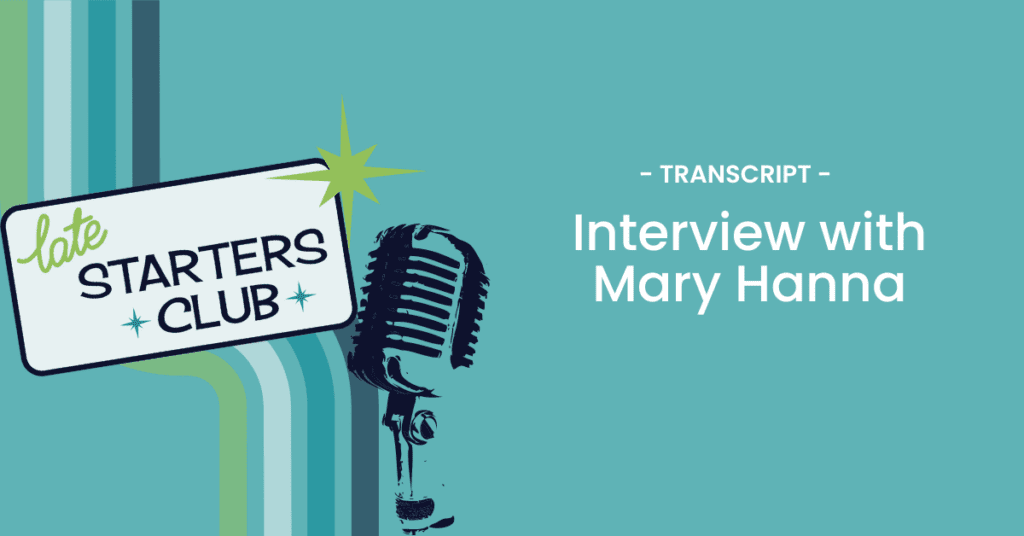
Andrea Vahl: Hi, late starters. Today I have the absolute privilege of interviewing Mary Hanna, who competed in her very first Olympics in her forties. She has gone on to compete in six total Olympics, and hopefully one more coming up as she is in her sixties. She competes in the equestrian sport of dressage, and I just loved talking to her about her stories of tenacity. Love of the sport and her views on aging. Listen in.
Intro: Hello dreamers. Welcome to the Late Starters Club, giving you the inspiration, mindset and tools you need to start something midlife and beyond. Remember, it’s never too late to follow your dreams.
Andrea Vahl: Starters, it’s your host, Andrea Vahl, and I am so excited for today’s guest.
I am excited to be here with the wonderful Mary Hannah coming to us from Australia. And she has competed in six Olympics, about to be her seventh and I’m just excited to share her story with you. It’s so inspiring. I’ve been reading and looking at all her interviews and all kinds of stuff.
It’s just it’s amazing. So welcome Mary to the show.
Mary Hanna: Thank you very much, Andrea.
Andrea Vahl: Yeah. Great. I know I’ve read a little bit, but I’d love to hear about how you got started in the sport and it’s dressage, right? Dr. Am I pronouncing that right? Actually..?
Mary Hanna: It’s, dressage or dressage. Yes, that’s correct.
Andrea Vahl: Yes. And you’ve got a book out about it, but I’d love to hear you share a little bit about how you got started in this amazing sport and competing in Olympics.
Mary Hanna: Okay I’ve came from a very horsey family. So we used to live down on a big grazing farm down in the western districts of Victoria.
And part of the work every day was looking after the sheep and cattle. And we used to ride our horses, or in those days when we were kids, our little ponies around and help our parents to round up the stock. But my mother was a very competitive person, and interested in all things that were competitive and horsey.
So she got us started on the competitive side of things. And my dad was also competitive, but he was a little bit more in the background and , he used to kinda take over there. Anyway, we just grew up normal horsey family, went to pony club, just did all those things. At some point in time there, I went off to a pony club camp.
We used to have these camps, kids, we love them. And we had a particular instructor that weekend , a very famous man called Bill Roycroft. And Bill Roycroft, I found him to be a huge inspiration. He talked about all the Olympics he’d been to, and he’d won gold medals and gold medal in a team.
He was an amazing man. They were an amazing family and he made me sort of realize that you could dream of these things, although my mother always had big dreams too. But he talked about his journey and how he got to the Olympics and that was of course, in three day event in eventing, not dressage. But at the end of his life, he became very interested in dressage actually.
Various people along the way inspired me and opened up the doors. And my mother and he were major people. There were others that many others that inspired me. But what really turned it around was.
My first husband Gert Donvig, was a Danish, and he had a very big dressage background and breeding warm blood horses. So I got him interested in the jumping and eventing, which was my love, and he got me interested in the dressage .
And in those days, We used to have a competition called the Hague Cup. It was a big international competition to try and involve all countries where instead of transporting the horses, the judges traveled around to all the various countries and judged the competition. And he had a very lovely warmblood stallion called Kilof McOhl. And he was supposed to ride Kilof in this competition.
And then at the last minute that they said, look, you can’t ride cause you’re a professional. The rules of that professionals and amateurs were different in those days. So he said, that’s no problem. I’ll put Mary on. We’ve got two weeks. I’ll teach her how to ride him and she’ll ride him. And remarkably they accepted that.
So I had a two week crash course in riding, present George on this wonderful stallion. And I went up to the competition and the horse went very well and we came second. Which considering I hardly knew what I was doing was amazing but I thought this is pretty good. I like this . My grades started to play a lot more with teaching my eventers more dressage and getting a lot more involved in it.
But I think that was the real spark in the end that got me going. .
Andrea Vahl: Yeah. That’s exciting. So you were an accidental competitor in that way.
Mary Hanna: I probably would’ve ended up there anyway because of his passion for dressage. But that’s speeded the whole process up .
Andrea Vahl: Right so when was your first Olympics?
Mary Hanna: It was a real turning point. I had one particular beautiful warm blood mare that I was riding for an owner. And I trained her to quite a high level in eventing. But I found that she’s quite talented with the dressage.
And then I was watching, Gert training and thinking about what I’d done with Kilof and started to train her. And I thought I’d really like to train this mare up to do Grand Prix and so I started teaching her everything for the Grand Prix test. And she was very talented. And one day I was off at a one day event somewhere, and she’s a beautiful jumper, but she probably should have been a show jumper, not an eventer, because she had a beautiful bascule over the fence.
She didn’t like to go flat and fast. She wanted to take her time and round over the jump. . And so there was a great big ditch and she was trying her heart out about everything and she took off and she rose and did a beautiful bascule, but she just didn’t make the other side. And she landed and she hit her face on the pole at the back of this fence.
Through no fault of her own, she just didn’t make it. And I was standing beside her and looking at her and there was blood on her face, and I thought, this is not fair. I’m not doing this to this horse anymore. She’s not meant to be doing this. She’s meant to be a dressage horse. . Then I really concentrate on training her for dressage.
A nd from then I thought, oh, I think the dressage is where my true love’s going be now. And so then I really turned completely to training all the horses for dressage.
Andrea Vahl: Oh, nice, nice. Yeah. Yeah. And then, so you were training and then how long did it take to actually train to get into the Olympics? What, what was that like?
Mary Hanna: The first thing you have to do is to train a couple of Grand Prix horses if you’re thinking about the Olympics. So I trained that mare to do nearly everything. But then, because I had an owner, she was sold actually to the Japanese. But we made a little bit of money and then I put that towards getting another beautiful horse called Old Pardon.
Beautiful, big thoroughbred. Old-fashioned thoroughbred gorgeous horse and big liver chestnut. And I trained him, he was my first Grand Prix horse that I trained all the way myself and competed in Grand Prix. And so he was the starting point. And I did have Olympic aspirations at that time with him.
Unfortunately a year or so down the track he actually broke down, so he had to be retired. And that was really sad for me and that took me a bit to recover from that. Cause this is really attached to that horse. But then I started with other horses.
But I guess at that time with my first husband, my focus was a lot on helping him as well. I wasn’t trying to be the main person in the limelight. , I was actually trying to stand behind him and do it as well along the way. . And unfortunately as you’re aware, he passed away in a car accident.
And then I, after some time I remarried, but by then I was running the business myself and I had to be the number one person to run the business and to be the face of the business. But my second husband was extremely supportive about my competitive career and really helped me and pushed me to have more focus. And it was with him through him making me drop a lot of other things and just focus on this one thing.
Cause you have to be incredibly focused to get to the Olympics. . So he helped me with that, he’s a good sportsperson himself and a very good business manager and very good at making strategies. And so he helped me really align things and get myself in the right position to eventually get selected for the Olympics.
And that was with a beautiful little horse called Mosaic. . And my first Olympics was in Atlanta.
Andrea Vahl: Oh, nice. Yes. Nice. That’s wonderful. And how old were you at that point for your first Olympics?
Mary Hanna: I was around 40 for my first Olympics.
Andrea Vahl: Yeah. Yes. That’s what I thought it was 40 for the first one.
That’s just, that’s so amazing. Obviously, it takes so much time to train a horse and there’s probably a wider range of ages for dressage. But you are, you have been the oldest competitor in that arena in every Olympics? I think it was…
Mary Hanna: No, I don’t think every Olympics, but certainly in the last few.
Andrea Vahl: Yeah, the last, yeah. No, not in the early time. That’s right. Yeah. Yeah, for sure. So that’s amazing and I love the quote you had in a recent interview that said you just didn’t even consider your age.
Mary Hanna: We sort of don’t in the horse world because we have such a variety of ages in the horse world. You can be aiming for the Olympics from when you’re 17 or to my age. It’s, it makes no difference and nobody really discusses it.
And it’s quite interesting when I go to World Championships, nobody mentions age. Never. Not one word, because it’s all the horse people. And it’s irrelevant. There’s no excuses made cuz you’re old. That’s just doesn’t make any difference at all. It’s gender equality also. You can be anybody from anywhere and whatever you are.
. You can be a competitor on equal standing with every other person, and you are treated as such. It’s only when I get to Olympics, people start mentioning this business with age, and sometimes it comes as quite a shock to me because it’s like I don’t even really think about it. I think about it when I’m sort of a bit stiff at night and getting, or getting outta bed in the morning.
But once I get on that horse, I never give it a thought when I’m riding. Not at all.
Andrea Vahl: That’s awesome. And so did you think that when you started, when you were, 40, that you would still be competing at this age?
Mary Hanna: No, we always joke about that cuz I said to my husband, if I could just do one Olympics, it would be so wonderful.
I would just, actually it started before that at the World Championships cuz I did the World Championships in DenHaag two years earlier and I could just do one international competition. And we did that quite successfully. And then I said, ah, oh, just one Olympics would be really great. That would be really great.
And so we made that and then so it went on, just one more. Just one more. And now nobody even listens. When I say Paris would probably be my last one, they don’t even pay attention anymore. Not that Paris is in the bag. Cause there’s a long way to go before you can get a selection for Paris. A long way to go.
But you know, you’ve always gotta make the aim, make the plan.
Andrea Vahl: Yeah. That’s great. Do you think you get some of that competitive nature from your mom? Is that where that…?
Mary Hanna: Definitely. But my husband is highly competitive also. And I always say he’s a bit like a show Mother, cause he loves me to compete and he just supports me so much whenever I go, oh, I don’t know about this. He’s don’t be ridiculous, come on. You can do it. And so he always picks me up. When I’m feeling a little bit down about things, he’ll do everything he can to try and make me pep up and keep going.
Which is nice. Cause you need that. You need person standing behind you in your low times.
Andrea Vahl: And that’s, that kind of brings up one of the questions we had is what really does motivate you to keep going? Obviously, you have the support of your husband, but what is it that also motivates you? Because it is difficult.
Mary Hanna: It’s a life, it’s a lifelong passion. And I have tried other things. I’ve tried golf. I do enjoy golf, but I’m definitely not going to be a superstar in golf. It’s just something that I enjoy doing and it’s a very frustrating game. Very frustrating
I did do quite seriously sailing for some time. I started sailing when I was 50 on a boat called an Etchell. And I was quite competitive in that I got to a world championship with the Etchells, but it just didn’t do for me what the horses do. It’s just my reason to get out of bed every morning.
I think my body would break down if I didn’t do it. I notice if I don’t ride for a couple of days, that I feel quite stiff and sore in my back. It keeps me supple, it keeps me going. If I sat around and didn’t ride, I’d probably eat too much and put on a lot of weight.
It keeps me fit, it keeps me well and I just, I can’t imagine life without it. , I just can. Do it. I have to have a horse in my life. Always.
Andrea Vahl: That’s so wonderful. And how do you think. Being older as an Olympian has helped you, do you see it as an advantage?
Because, obviously it’s, you, maybe there is more stiffness or prone to that or whatever, but are there other advantages that you think you have being older as an Olympian?
Mary Hanna: When I’m actually competing at Olympics, I think I manage to stay quite focused. It’s when you get to the Olympics and it’s your first Olympics, you can get quite distracted by all the things that go around it.
. It can be quite difficult, especially with your horses, to stay focused on doing exactly what you are supposed to do with that horse and not overdo it and not, watch other competitors and then work your horse too hard. Most people who go to the Olympics in equestrian. Are used to riding many horses every day and being very busy and, maybe teaching some people and would ride maybe, I don’t know, 10 horses a day.
And then there you’re sitting there with one horse a day to ride and then you have to have this incredible focus and control to make sure that you don’t overdo things. So I think that being an older rider, I’m probably better at that. The young ones get very antsy and sort of just dunno what to do with themselves.
. Not to say that they don’t do a very good performance anyway, but this is just one of the things. Look, it’s just a great thing going to the Olympics. It is quite different to any other competition, , and it does sort of set you up for life. It’s gives, it’s really something, a lot of kudos in it.
And with horses, I think if you’ve been an Olympian, people take you more seriously about your sport and what you do. They realize it’s not just a hobby. A lot of people think, oh, you’re just some old lady that rides a horse and it’s just, some hobby thing that you do and don’t get it.
But when you say you’re an Olympian, they sort of go, oh, they seem to understand that might be just a little bit more than just a hobby.
Andrea Vahl: I would say so for sure. . Yeah. I can’t imagine all the dedication you have to have to get to that level of competition. So that’s wonderful and so exciting.
And actually to your point on, just an old lady who rides a horse, it is interesting. Do you think that society’s views on aging have changed? Cuz I feel like there has been some shifts lately or some focus towards living a more richer and full life longer.
But I’d be curious to hear if you have felt that way as well.
Mary Hanna: Yeah, I think this is definitely gradually happening. It’s a bit like put it in the light of the fact that you can’t, nobody wants to work nowadays, anywhere in the world. I don’t know how it is where you are, but in Australia and Europe, it seems it’s very hard to get anyone to work in various jobs.
And so older people have normally a good worker ethic. . And so I think the world has had to take older people more seriously because actually we need to work longer and harder and I think that retiring has got no kind of appeal to me whatsoever. I would just be so totally bored but I feel like people do get this, a lot of my friends around my age who would normally maybe in previous years have just really retired. To see the need to keep doing things. My husband is a few old years older than me, and he’s not planning to retire. He doesn’t run his business directly, but he’s very involved with it and gets very excited about his business.
And it’s this mental stimulation that you need. And I think the world needs older people. I think that world is starting to realize that older people have a lot to contribute and I think we have a worldwide aging population old people gotta get out there and do something and be valuable, otherwise will sink, that’s my opinion.
Andrea Vahl: That is true. And I am right there with you. I don’t know if I’m ever going to retire. I think I’d be much too bored. And there’s so many interesting things to do out there. I’ve never done a lot of horse riding, but maybe I’ll take it up and try for the Olympics.
Mary Hanna: The thing is, I think it’s actually much better for your health mentally and physically to stay busy and keep going and keep working and keep doing it, whatever it is, your passion. My husband, he’s had various sports in his lifetime. He was very big on sailing for a long time. He used to be a three-day event rider before that when I first met him. And he always takes things on very seriously. And he’s 73 , and he’s really taken up golf in a big way. But you know, he’s just fighting to get his handicap down.
He’s just so determined. He just practices and he plays every day of the week and he’s succeeding just even at that age. He’s succeeding. He’s getting better and better at it. And there’s no reason why as an older person you shouldn’t have high goals and really push yourself hard and don’t use your age as an excuse. Just go for it.
Andrea Vahl: Exactly. I love that. That is so true. So true. Let me ask this I would love to know, what is your favorite part of the Olympics? Now that you’ve been. , six times and hopefully seven times. What kinds of things do you look forward to other than just the competition, obviously the competition?
Mary Hanna: I just that’s easy to answer. I absolutely love the opening ceremony. I absolutely love it. It’s the most exciting thing. And do you know, to see all the other nations and feel that atmosphere and I’ll never forget walking into my first opening ceremony in Atlanta.
It was just unbelievable feeling to march in. As an Australian and in your uniform and you just, and you feel so proud to be representing your country. And the vibe in there is this just unbelievable. And all these little highlights, I’ll never forget Muhammad Ali, lighting the Flame and then in Sydney Olympics, it was our own hero, Cathy Freeman. And these moments, they’re just like, sit in your memory forever. Cause it’s just such an amazing moment. . Just the whole thing of it. And I really missed that in Tokyo because of course, because of Covid there, we didn’t go to the opening ceremony.
And it was all very low-key. It really lacked the vibe in Tokyo. It was a very different experience. Glad that I did it, but very different. So for me, that’s the highlight of the whole thing apart from the competition.
Andrea Vahl: Yeah. It sounds so exciting. I’m just getting chills thinking about it.
It just sounds like. Magical. Yeah. Yeah.
You’ve had some unexpected obstacles that have come up with the death of your husband and, lots of things that have come along the way that kind of shifted your trajectory a little bit, but what are some of those unexpected obstacles and how have you moved past them and gotten through?
Mary Hanna: I’ve had a few things that happened. Obviously, when my first husband passed away, that was a very major thing. And I was very lucky because he’d left me with this business that I had a fairly good clue how to run and that really helped me just keep myself together. And keep my focus on life and not fall in a hole because I had to run the business. I had to look after the horses. So in that case, the horses and the business saved me. And of course, I met my second husband who I adore through the horses cuz he came to me for lessons.
So the next probably. . Oh no, it happened. Sorry. Before my husband died, there was another fairly big issue we had. We got burnt out in the bushfires. So when we were quite not very long into our marriage we’d built this beautiful property and we’d built a lovely indoor arena and we’d pretty well built it ourselves cuz we didn’t have a lot of money to spare.
And we got completely burned out except for our house. The whole property was burnt and we luckily saved all the horses. But you know, when you are young and we just, I know a lot of people didn’t pick themselves up after that, but we did. And we just, we did have some insurance, fortunately, so we just nailed ourselves into the working back to get it all going again, and then, actually, he had to go away to Europe.
He won a scholarship to go to Europe. I said you can’t do anything here, Gert, so you go to Europe and with a scholarship. Cause it’s a wonderful learning opportunity. He was in Germany learning with the best instructors and I said, while you’re away I’ll build the arena again and we’ll get everything sorted and we’ll get all the wreckage of the fire gone and we’ll rebuild which we did.
And of course, when you build it the second time, you build it better cuz you realize all the mistakes you made the first time. And it was quicker because it was insured and we weren’t scratching for each penny. So as fast as I could, I got the whole thing rebuilt. We had it rebuilt in three months.
Wow. So by the time he got back after his three months, we were ready to go again. So we got that going. More recently, in the last few years this happened, I was in Europe and I got that dreaded phone call that my daughter had a terrible fall and I didn’t even know she’s going to be alive when I got home.
Andrea Vahl: Oh wow.
Mary Hanna: So I just dropped everything, jumped on the plane. I left Rob in Germany with all the horses to pack up and organize everything and just flew straight home. I remember going to the hospital thinking will she be alive? Luckily she was, and she’s making a gradual recovery. But then I realized that I had to change everything and I had to be closer to where she was to help her out.
So that involved selling our property. Buying a new property, rebuilding everything, which we’re still in the middle of doing and building is no fun, I can tell you. So I, yeah, but luckily I’ve got this wonderful support system with my whole family here. , it forced complete change in lifestyle, but I think in some ways I’m probably where I’m meant to be right now.
So now we’re just rebuilding and redoing everything and that’s a huge turmoil of course. I don’t even have my horse at home with me. I haven’t just for that somewhere. So my whole life got turned completely upside down. But here we are still in the process of fighting to get back to some sort of normality.
Andrea Vahl: Yeah. Yeah.
Yeah. A lot has a lot has changed, but, health and family, it’s priorities have got to be number one right there. And that’s wonderful that somehow it all works out like you said, you’re where you meant to be maybe. So that’s great. And I’m glad to hear that your daughter is doing better.
I, I. . Yeah. I can’t imagine how scary that would be.
Mary Hanna: She’s a lot like me and she’s back on her horse and riding competitively that’s what keeps her going too.
Andrea Vahl: Yes. It’s good to hear that, that tenacity continues down the line. . So how about in a competition? Have you ever had an obstacle or a disappointment, and how did you work through that?
Mary Hanna: I think my biggest disappointment and my whole competitive life was the last world championship. I got to the up to Hanning in Denmark and got through we had to present the horses at the trot out the, they’re all sounding healthy. And we did all that. And then two days before the actual competition, we had a ring familiarization and my mare is very exuberant and can get a little bit like hot and nervy at times.
And she got a little bit stirred up in, in the. Things sort of went a bit wrong before we went in. It was raining and then we couldn’t go, and then we did go anyway. When she got in there, she overextended herself. And she injured her muscle in her hindquarters. And we tried everything, with massaging her and everything, but we couldn’t get it right for the start.
Oh, so after all those, years of preparation and getting there and she was really in top form, she’d had very good performances before the competition, and so I was really thinking this could be my best performance ever. And then very sadly, she hurt herself. And then the flat feeling when you just actually can’t start.
and luckily we had a team of four and so my school wasn’t obviously an count, but our team still managed to qualify us for the next Olympics, which was fantastic, but I felt so flat to be not part of it and to, to not be part of the contribution to that Olympic qualification and for my poor horse to be injured.
And it was just, oh, I’m still recovering. Actually, it really knocked me, now I have to pick myself up. And we are looking at younger horses and getting ready for the next paris. But, it’s a long, hard road and there’s no guarantee I’m going to get there, but I’m certainly giving it my best shot.
Andrea Vahl: Yeah. That would be very frustrating to not even get to compete. I imagine.
We are coming to the end of our time here, and I would love to just ask if you have any quick advice for our listeners who might think that it’s just too late to get started.
Mary Hanna: Ah, look, it’s never too late, and you’ve gotta have the dreams and go for it. And if you’re an older person and you want to, you mean too late to ride or too late to go to Olympics as well either. Yeah. It’s never too late to ride a horse ever. You can learn that at any age.
Yeah. How uh, what standard you’re going to. . . do it to That all depends on your talent your ability to get some good instruction to get the right horse. But let’s talk about in sports in general. I think there’s a lot of people who are older nowadays being very successful. , or a lot of people that have been successful as young people.
And then, Come to that point of retirement and keep going. I’ll give you an example. My very good friend Linda Hums Robinson, has a son, Shamus, who’s an extremely good fencer, and he’d been a world champion in his younger days, and he went to Athens Olympics with me.
And he is now 45. And he went back and he won, just won the Australian Championships and they were all shocked. They couldn’t believe it. they were like, how does this happen? Someone who is 45 doesn’t come out and win an Australian championship in fencing. He just did. So there you go. Just do it.
Andrea Vahl: I think that is, that’s so great and so inspiring and I think you can find different places. It doesn’t necessarily always have to be Top Olympics, maybe, there’s other competitions out there that if you do want to compete, I think you can find something local and just excel at that. Push yourself.
Mary Hanna: Yeah. It can be on all different levels. It doesn’t have to be Olympics. You just have to, like my husband’s doing with his golf handicap, you just have to get out there and absolutely hammer it and get where you want to be.
Andrea Vahl: Yeah. That’s wonderful. What I’d like to ask all my guests is a favorite quote, and I’d love to hear a favorite quote of yours.
Mary Hanna: Okay. Well, This one’s kept me going my whole life. When the going gets tough, the tough get going. And that’s been my motto through my whole life, that came from a very lovely old man that I met early on.
A dressage guy that was just fantastic. Iron Matthews. And I’ve always thought about that and when things have really got rough, I’ve just thought about that saying it’s so good.
Andrea Vahl: Yeah, that is, that is a beautiful motivating quote. Just do it. You are certainly very tough and I just am inspired by all that you’ve achieved and I think it’s wonderful and thank you so much for being on the show and inspiring my listeners and people beyond and, everywhere around the world.
It’s great.
Mary Hanna: Thank you very much, Andrea and I do hope it has inspired some people to get out there and just do it. .
Andrea Vahl: Yep. Yep. And good luck with the Paris Olympics.
Mary Hanna: Thank you very much.
Andrea Vahl: Hope that was helpful. And make sure you grab the free guide, top Tools for Late starters on the website at latestartersclub.com and let’s turn dreaming into doing.
Join the conversation.
Let us know what you think about this episode.
Never miss an episode.
Subscribe to the podcast
You may also enjoy…
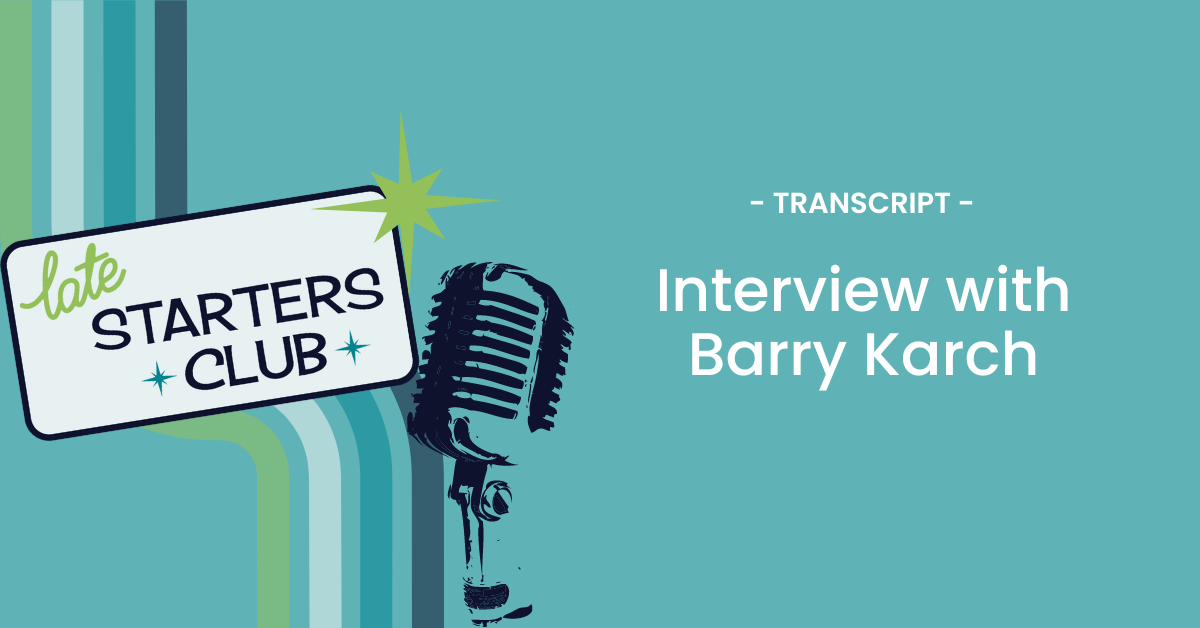
Ep170 Transcript: Finding New Motivation with Barry Karch
Finding New Motivation with Barry Karch Andrea Vahl: It's never too late to restart something you loved. My guest today, Barry Karch, started training for a marathon after a 20 year hiatus. And we'll also dive into how he climbed the equivalent of Mount Everest...

Ep169 Transcript: Questions to Kick Start 2024
Andrea Vahl: Oh, happy new year. Yeehaw. 2024. All right. I don't know about you, but I love planning out my year and setting goals and really reflecting on how my past year went and being super intentional about what I want the next year to look like. In today's...
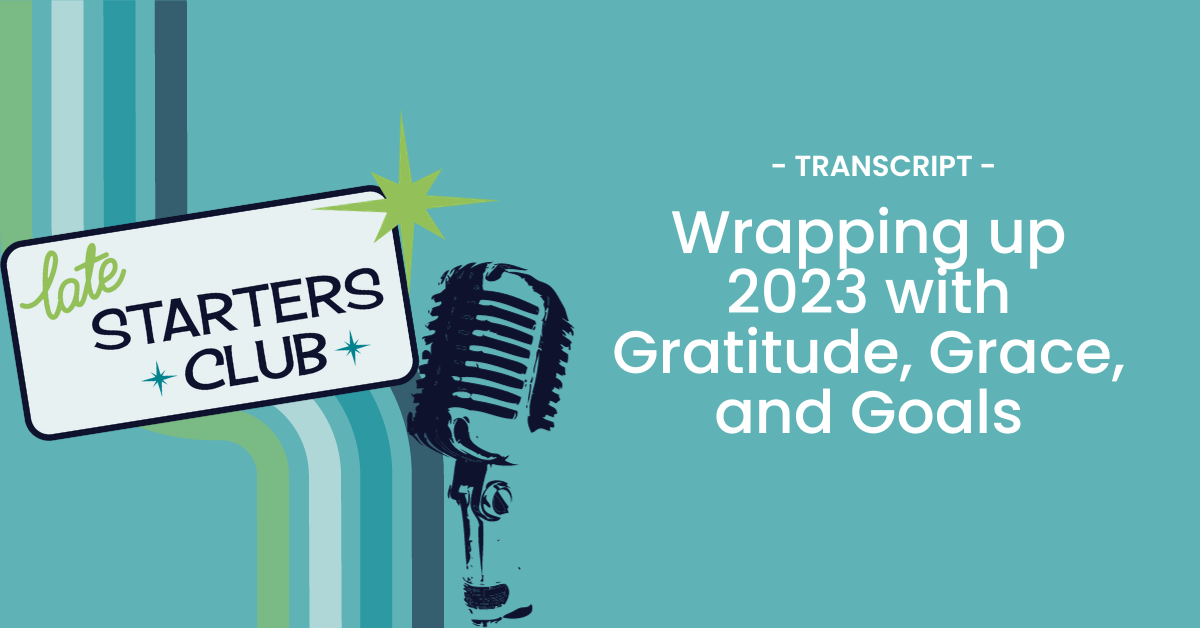
Ep168 Transcript: Wrapping up 2023 with Gratitude, Grace, and Goals
Hello, late starters. It's your host, Andrea Vahl And today is Christmas day. And if you do celebrate that Merry Christmas, if you celebrate some other holiday, I wish you all the best and all the joy for that. I just wanted to make a different episode. So today we're...
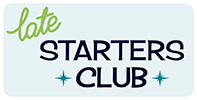
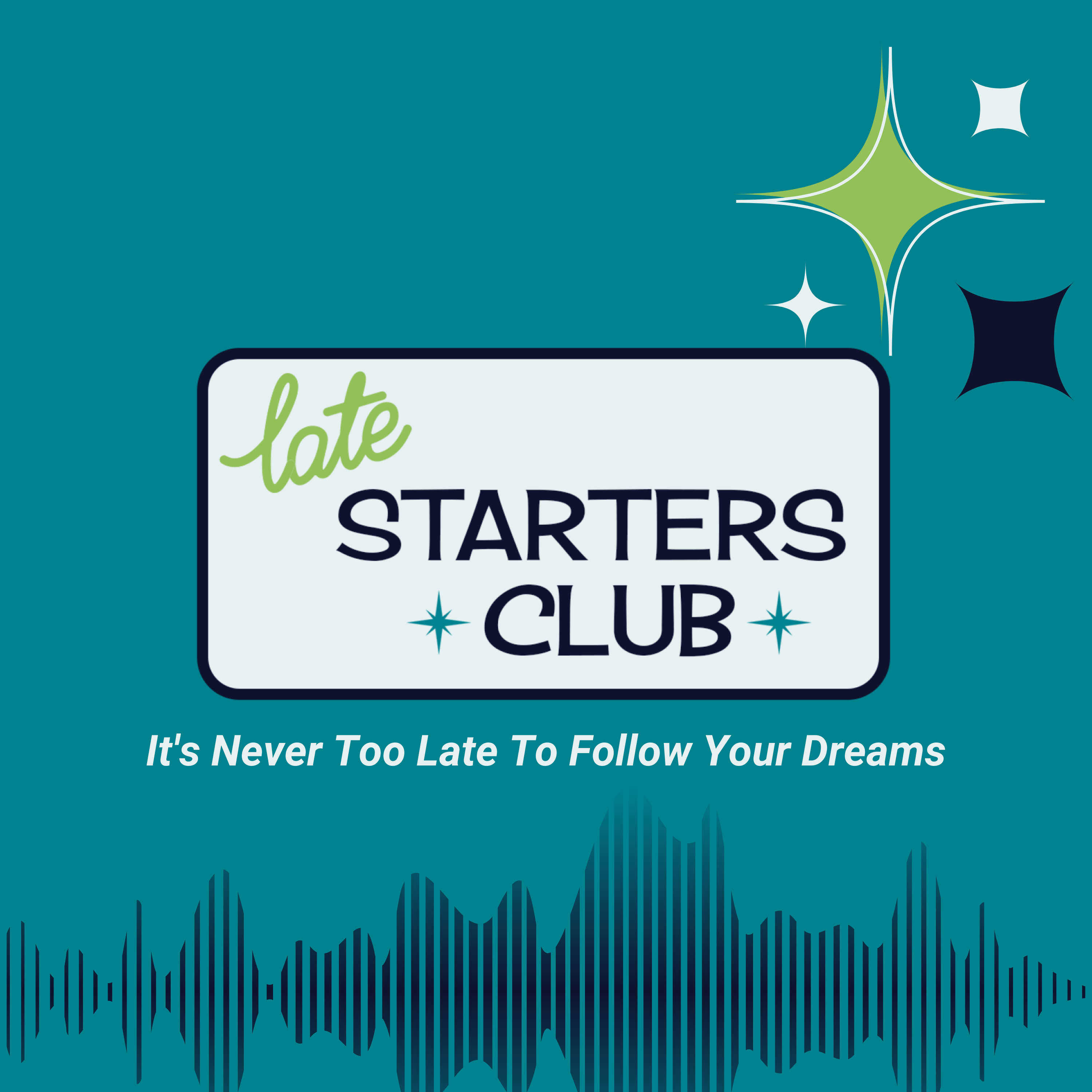
0 Comments